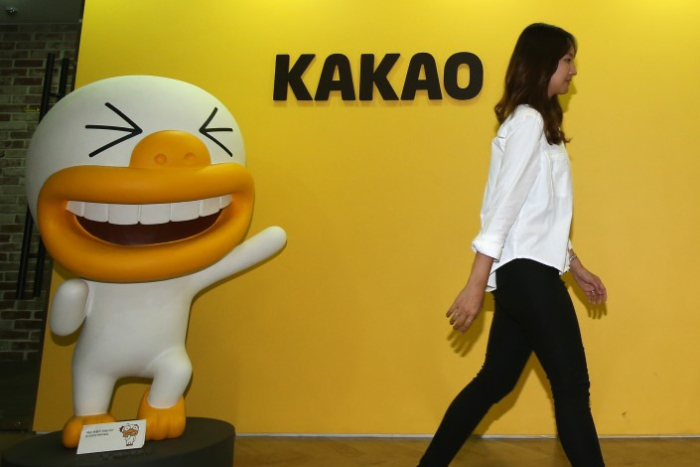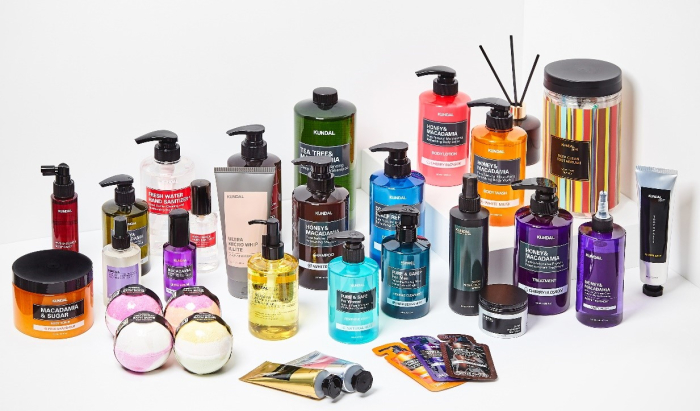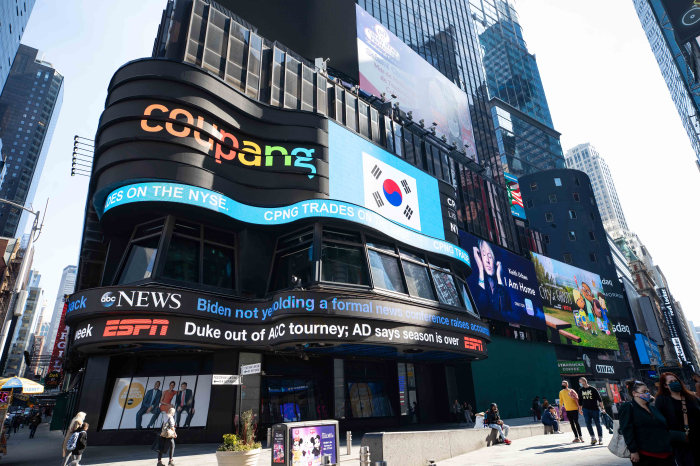E-commerce platforms
Kakao's fresh e-commerce strategy puts Naver, Coupang on guard
Kakao bucks trend; disrupts Korea's e-commerce landscape
By Jun 07, 2021 (Gmt+09:00)
4
Min read
Most Read
LG Chem to sell water filter business to Glenwood PE for $692 million


KT&G eyes overseas M&A after rejecting activist fund's offer


Mirae Asset to be named Korea Post’s core real estate fund operator


StockX in merger talks with Naver’s online reseller Kream


Meritz backs half of ex-manager’s $210 mn hedge fund



South Korea’s mobile platform Kakao Corp. is set to shake up the country's e-commerce market in the second half of the year with the launch of its own e-commerce service -- throwing down the gauntlet to platform giants Naver Corp. and Coupang Corp., which have been leading the sector for years.
As part of its e-commerce strategy, Kakao will charge no commissions and adopt a direct-to-consumer (D2C) business model to foster companies' online shopping malls on its platform. The company is also expected to make use of data from 47 million users on the country's largest messaging app, KakaoTalk.
Kakao plans to roll out the e-commerce platform next month, according to the retail industry on June 6. The company has been reaching out to manufacturers at the forefront of their respective industries, including LG Household & Healthcare, Maeil Dairies Co., Yuhan-Kimberly and Samsung Electronics Co. to offer their online shopping malls on Kakao's platform.
“Since April, Kakao has been running pilot tests with companies such as Nike, Korean Air Lines and Kundal,” said a retail industry official.
Last month, the sales team from Kakao's business platform Talk Channel visited Kundal, a beauty brand under The Skin Factory Co. umbrella. In the four years since its launch, Kundal has become a sensation in the beauty industry, logging around 120 billion won ($108 million) in revenue last year.
However, Kundal's management was concerned that its dependence on major e-commerce platforms, such as Naver and Coupang, was rising in line with its growing revenue. This is why Kundal accepted Kakao’s proposal to help grow its online shopping mall.

Kakao's new e-commerce service, referred to as "Talk Channel 2.0," will offer manufacturers' online shopping malls on its messaging app, KakaoTalk. The company's strategy is to buck the trend by ditching its privilege as a major platform and challenging the status quo.
Unlike its industry peers such as Naver that takes commissions from online shopping businesses on its platform, Kakao has decided to flip the approach and charge zero commission.
Also, Kakao plans to open up its service tools such as simple log-in and payment systems, as well as sharing data related to shopping and its users with the online businesses on its e-commerce platform.
“The biggest difference to Naver is that Kakao shares data with businesses on its platform,” said a Kundal official.
According to industry watchers, domestic manufacturers that have relied on Naver and Coupang have been taking great interest in Kakao’s new e-commerce service.
THE WINNING MOVE
Kakao's weakest point is considered to be the shopping industry. KakaoTalk's advertising and gift delivery businesses posted revenue of around 1.1 trillion won last year, up by 72% compared to the previous year.
And even with its live commerce business, KakaoTalk's shopping transaction volume remains below 5 trillion won -- a stark contrast to Naver and Coupang, which posted 28 trillion won and 24 trillion won in transaction volume last year, respectively.

Kakao's tactic is to address the concerns that manufacturers and small- and medium-sized companies have toward Naver and Coupang's market power.
Coupang's buying power continues to strengthen with the platform boasting around 17 million users as of the end of May. Large companies are overwhelmed by its success and find it difficult to compete against Coupang, which prioritizes consumer benefits.
As for Naver, companies need to pay around a 4-5% sales commission to establish a store on its platform. While it's effective in drawing customers, it ends up costing more because of various marketing fees associated with features such as keyword advertising and appearing on search results.
Due to this, many manufacturers and retailers are ramping up to cultivate their own online shopping malls so that they can coexist with major e-commerce platforms, industry watchers say.
“Kakao will also be suggesting various advertising options once its shopping platform grows,” said a retail industry official, adding that Kakao is trying to rattle Naver’s e-commerce growth strategy.
Meanwhile, the bid for eBay Korea, the operator of e-commerce platforms Gmarket and Auction, is set to kick off on Jun. 7. The country's two retail giants Shinsegae and Lotte groups are seen as strong candidates for the deal estimated at around 5 trillion won.
Write to Dong-hui Park and Min-ki Koo at donghuip@hankyung.com
Danbee Lee edited this article.
More to Read
-
 Corporate cultureInside Coupang: Close-knit, challenge-seeking, data-driven
Corporate cultureInside Coupang: Close-knit, challenge-seeking, data-drivenJun 01, 2021 (Gmt+09:00)
5 Min read -
 E-commerce platformsNaver to challenge Amazon with launch of Smart Store platform in Spain
E-commerce platformsNaver to challenge Amazon with launch of Smart Store platform in SpainJun 06, 2021 (Gmt+09:00)
3 Min read -
 Food delivery appsSurvival of the richest: Coupang corners Baemin
Food delivery appsSurvival of the richest: Coupang corners BaeminMay 27, 2021 (Gmt+09:00)
3 Min read -
 [Exclusive] E-commerceNaver, Shinsegae in talks to team up for eBay Korea
[Exclusive] E-commerceNaver, Shinsegae in talks to team up for eBay KoreaMay 19, 2021 (Gmt+09:00)
4 Min read -

-
 Share swapShinsegae, Naver ink $221 mn share swap to rival Coupang in e-commerce
Share swapShinsegae, Naver ink $221 mn share swap to rival Coupang in e-commerceMar 16, 2021 (Gmt+09:00)
3 Min read -
 IPOsCoupang CEO: S.Korean e-commerce market 'isn't small,' offers robust growth potential
IPOsCoupang CEO: S.Korean e-commerce market 'isn't small,' offers robust growth potentialMar 12, 2021 (Gmt+09:00)
5 Min read -

Comment 0
LOG IN


